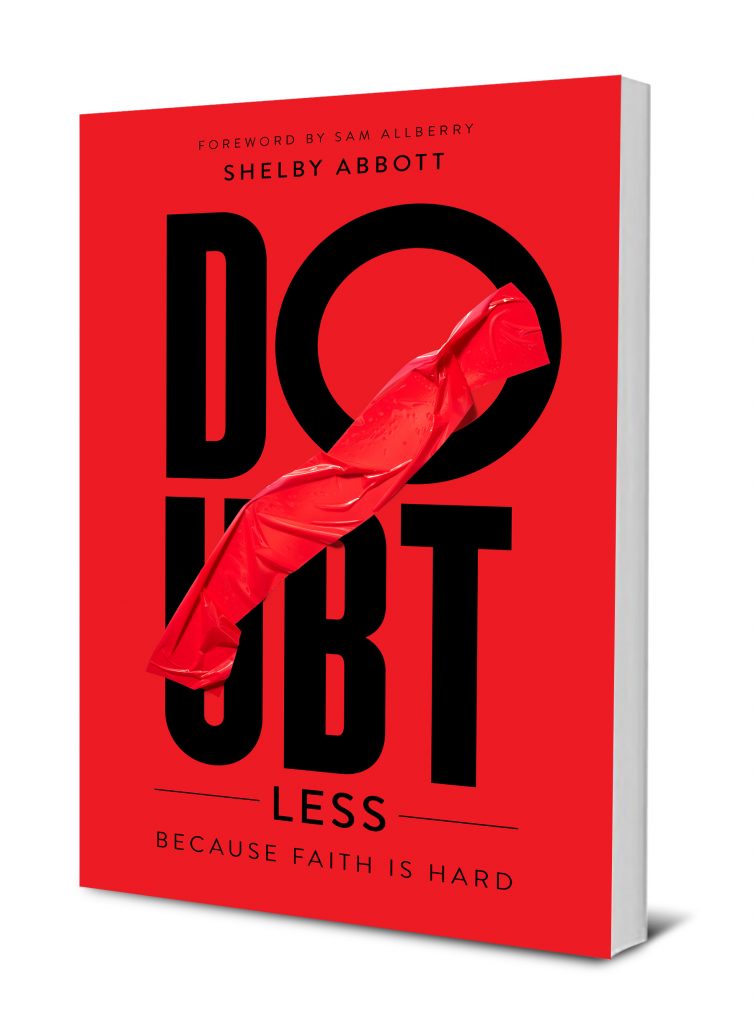“How can I be sure that God is real?” Kyle asked me. “And if he is, why does he let so many horrible things happen every day?”
“Yeah, and aren’t there a ton of errors in the Bible?” Ben cut in, before my mouth even opened to answer Kyle. “How can we trust that it’s actually the Word of God?”
Ben and Kyle were two college students I worked with who were battling some serious doubts about God. A couple of professors had challenged their beliefs and, as a result, they were clearly wrestling with their faith.
Watching students struggle isn’t fun. My constant temptation as I met with them was to refute the things their instructors stated, point by point, and, in a sense, “win” any arguments between me and people who weren’t even in the room. But by God’s grace—and despite the fact that I was incredibly angry at their professors for the amount of distress they’d caused—I resisted that temptation.
“I’m so proud of you both for seeking truth and honestly inquiring about eternally significant things,” I said to them. “These are the healthy steps to take when you’re doubting.”
In the end, I typed up a resource guide for each of them and encouraged them to read about our faith. I told them they shouldn’t be ashamed about their doubt, but I stressed that where doubt could lead was, spiritually speaking, a matter of life and death.
FOUNDATIONAL DOUBTS
Working in full-time college ministry over the last two decades, along with seeing family and friends abandon the faith they once proclaimed, I’ve noticed that believers are struggling more and more with doubt. And, for many, doubt becomes unbelief.
All doubters aren’t the same though, nor are all doubts.
Some are working through what I call “foundational doubts”—the kind of doubts that rock your faith to the core, and, if left unchecked, can lead to unbelief’s doorstep. I’ve talked with several students, often new believers, who’ve had difficult questions they were unwilling to ask publicly for fear that their friends would think they weren’t “good Christians.” They saw their questions as signs of weakness or immaturity; so they dealt with them privately, only causing their doubts to fester and increase in strength.
But doubt doesn’t differentiate. Nonbelieving students have plenty of doubts that hold them back from faith. And even mature Christians can begin to have foundational questions. Factors in every season of life can toss someone into the stormy seas of question-inducing foundational doubt regardless of age, experience, or even spiritual maturity. And I believe the Christian community should be the place where questions are welcomed and worked through together.
SAFE SKEPTICS
We take our cues from the Bible, and Scripture is full of honest questions. Consequently, the church can invite sincere questions from men and women who are wrestling as well—not only so we can point them to resources and pray for them, but also so we can be godly friends to them and encourage them through the struggle. All of us need Christlike friends to lean on when the storms of life shake us up.
It can be difficult to embrace “doubters,” knowing we may not have answers ourselves, but we needn’t be afraid of the questions. Christianity has existed for 2,000 years and has never collapsed on itself because of questions. A Christian community, like a church or Bible study, can be a free and vulnerable environment where believers continue to experience God’s grace, and nonbelieving people can feel safe to be skeptics and in turn see the love of Christ shine brighter than anything they’ve ever seen before. If nonbelievers in your life experience this kind of open atmosphere, we will see lives transformed and people coming to Christ on a regular basis.
PERSONAL DOUBTS
A secure place to question isn’t only important when it comes to those “foundational” issues, but it should also prime the pump for healthy dialogue concerning intimate doubts that will inevitably come up as life goes on. These personal doubts sound more like, “Where are you, God?” rather than “Does God exist?”
A young Christian, for example, may not have experienced life’s heaviness the way an older person has—heaviness like intense marital strife, miscarriage, a loved one walking away from Christ, financial loss, or declining health. Life can be incredibly difficult and, when challenges arise, human beings naturally ask questions about God in ways they hadn’t before. And that’s completely okay and normal.
A Christian—young or old, mature or immature—should never feel like he is above asking questions that plague the heart. Our security in Christ means that, even if you’re unsure about certain elements of your faith, he will always stand firm and give you room to wrestle.
In his book A Severe Mercy, Sheldon Vanauken said, after the untimely death of his wife, “To believe with certainty, one has to begin by doubting.” Truthfully, someone who asks questions and brings their doubts to God might likely have a stronger walk with him than someone who knows all the right answers during Bible study.
BURIED TREASURE
Jesus said, “. . . unless you turn and become like children, you will never enter the kingdom of heaven” (Matthew 18:3, ESV). I always thought childlike faith was a dumbed-down, naïve faith. Then I had two kids, who started growing up and asking questions every single day.
My kids have taught me that a childlike faith isn’t a dumbed-down faith. It’s a question-asking foundation of faith that leads to answers, producing joy in the journey.
There is joy in adventuring to find something we value.
When I was eleven years old, my sister and I found what we believed to be a treasure map in the woods behind a friend’s house. We were skeptical of its authenticity because, you know, it was a treasure map—and, to the best of our knowledge, pirates didn’t bury chests of gold on landlocked Air Force bases like the one where we lived. But once we saw the map in fact charted the area of the very place we were standing, we didn’t care if it was real or not, we were going to follow it to its conclusion.
And we did. Sixty jubilant minutes after my sister and I found the map, we were digging with our hands in the ground where the corresponding X was marked on that piece of paper. About two feet into the dirt, we came across a small wooden box, no bigger than a textbook. My sister squealed with delight, and my heart raced inside my little ribcage.
We plucked that mysterious box from the earth, set it on the ground, and opened the lid. We had no idea what would be inside, but the hysteria of that moment was no doubt the reason I remember this story so vividly nearly thirty years after it happened. Inside, the purple-velvet-lined box boasted two gold coins, one gold ring, and a thin gold chain.
We looked at each other amazed. We couldn’t believe that we’d actually found buried treasure. In the woods. On a military base.
We sprinted home, riches in hand, and ecstatically recounted the story to our parents, who, by the way, still claim that they had nothing to do with the map or treasure.
I’ve found that sometimes as we seek God, he can seem difficult to find. And in the pursuit, it can be easy to doubt that he’s there at all. But God’s hiddenness is ultimately an invitation to look for him, not the opposite. Scholar Greg Thornbury’s comment on the matter is something I find helpful when I feel God is missing: “When God seems to be absent, it is in no way a stiff-arm from the ethereal realm, but rather a request to enter into the joy of searching after Him.”
Much like my treasure hunt when I was a kid, our search for God when he seems hidden can be an extraordinary experience, depending on our perspective. When God appears to be veiled from our senses, he wants us to find him; and when we search, there can be great joy in the hunt. The questions you have about God imply interest in him, so why not pursue him as you ask and doubt, and encourage your peers to do the same? God can certainly handle it. And there just might be buried treasure in your future.
doubtless: BECAUSE FAITH IS HARD
Is God good? Can I trust him with my life? Is the Bible true? These are just some of the questions that can plague young adults as they stand at the crossroads of life, when new responsibilities loom large and the world around them treats God as a small or irrelevant part of life. In DoubtLess, Shelby Abbott comes alongside young adults to help them honestly face their doubt and turn to God for the gift of faith.






